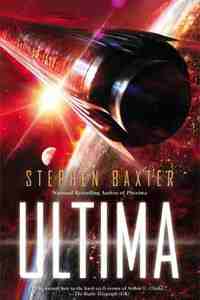
First published in Great Britain in 2014; published by Roc on August 4, 2015
Ultima sounds like a sports drink but it is actually the sequel to Stephen Baxter's Proxima. You should read Proxima before reading Ultima if you want to understand all of the novel's references to past events, but enough of those are summarized that Ultima can be read as a stand-alone novel.
Ultima is a novel of big ideas -- or, more precisely, it is an exploration of one big idea. It won't appeal to science fiction fans who think that sf should always include Wookiees or Vulcans. It won't appeal to fans who crave action. It might not appeal to sf fans who think that an "idea" novel should consist of ideas piled on top of ideas (the kind of novel that usually treats plot and characterization as unimportant).
I give Baxter credit for creating the Dreamers, a Machiavellian alien race that differs from other science fiction aliens in imaginative ways. Saying more about them would spoil the fun. I will say, however, that while the enigmatic Dreamers are at the novel's core, the novel focuses upon the consequences of the Dreamers' actions rather than the Dreamers themselves.
Proxima introduced an old idea, portals (or "hatches" in this incarnation) that take people to different places in the universe, or different universes, or different times. Hatches are coupled with transitional events that change the nature of the universes that key characters inhabit. In one alternate history/universe/timeline, there are three space-faring Terran powers: the Romans, the Xin (Chinese), and the Brikanti (Brits allied with Scandinavians). The civilizations have mastered a crude form of interstellar travel (combining power sources known as kernels left by the Hatch builders with "point and shoot" navigation) despite their failure to develop computers.
War is brewing and one of the ships has undertaken the mission of saving Earthshine, an AI that serves as a repository of information designed to allow human civilization to survive, or to rebuild it if necessary. Earthshine has its own agenda. It is, in its own way, as Machiavellian as the Dreamers. Earthshine "hatches" a plan of itsown that bears fruit in another universe/alternate history, one in which Incas dominate. That plan puts Earthshine, another AI, and several human characters in a position to understand what the Dreamers have been up to and what purpose all the Hatches serve. It is, as I said, a pretty cool idea.
The rest of the story fills up space with (alternate) historical and political developments and character building. I didn't think any of that was bad or boring (although that might be the reaction of readers who lack interest in history and politics), but I did think those parts of the book could have been profitably shortened. To the extent that Ultima is read as a mystery novel -- with Earthshine serving as the detective who unravels the mystery of the Dreamers -- everything else comes across as padding that keeps the story from delivering the suspense that a mystery should have. On the other hand, I liked the characters and I enjoyed Baxter's speculation about what alternative histories might be like, so I had no difficulty hanging in until the end. Readers who suffer from ADD or wookiee-mania might have a different experience.
The best part of this novel of the future takes place in the far far far distant future. It is wonderfully descriptive and even a little enthralling. Even if it takes quite a long time for the reader to get there, the destination is worth the effort of the journey.
RECOMMENDED